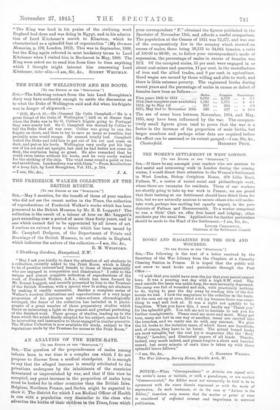AN ANALYSIS OF THE BIRTH-RATE.
[To THE EDITOR OF THE "SPECTATOR."] SIR,—The question of the preponderance of males among infants born in war time is a complex one which I do not propose to discuss from a medical standpoint. It is enough to say that the alleged increase is usually attributed to the privations undergone by the inhabitants of the countries devastated or impoverished by war, and that if this view be accepted, any great increase in the proportion of males born must be looked for in other countries than the British Isles. Belgium, Northern France, and Serbia might be expected to show it. The district for which I am Medical Officer of Health is one with a population very dissimilar to the class who pdvertise the births of their children in the Fixes, from which your correspondent " F." obtained the figures published in the Spectator of November 13th, and affords a useful comparison.
The population at the Census of 1911 was 72,277, and was one of the comparatively few in the country which showed an excess of males, there being 38,213 to 34,064 females, a ratio of 100.00 to 88.98; or, to follow your correspondent's mode of expression, the percentage of males in excess of females was 121. Of the occupied males, 55 per cent. were engaged in or about coal-mines and quarries, 11 per cent. in the manufacture of iron and the allied trades, and 8 per cent. in agriculture. Good wages are earned by those willing and able to work, and there is little extreme poverty. The registered births during recent years and the percentage of males in excess or defect of
females have been as follows :-
Males. Females. Percentage.
Five years 1909 to 1913 8,010 ... 5,7'73 ... 4.1 1914 (last complete year available) 1,181 ... 1,171 ... 0.1 1915, up to May 1st 357 364 ... – 1.9
1915, May 2nd to November 20th 690 ... 527 10.0 The sex of some born between November, 1914, and May, 1915, may have been influenced by the war. The compara- tively small figures given tend to prove that the war is a factor in the increase of the proportion of male -births, but larger numbers and perhaps other data are required before the effect can be assumed or its extent gauged.—I am, Sir, &o.,






































 Previous page
Previous page